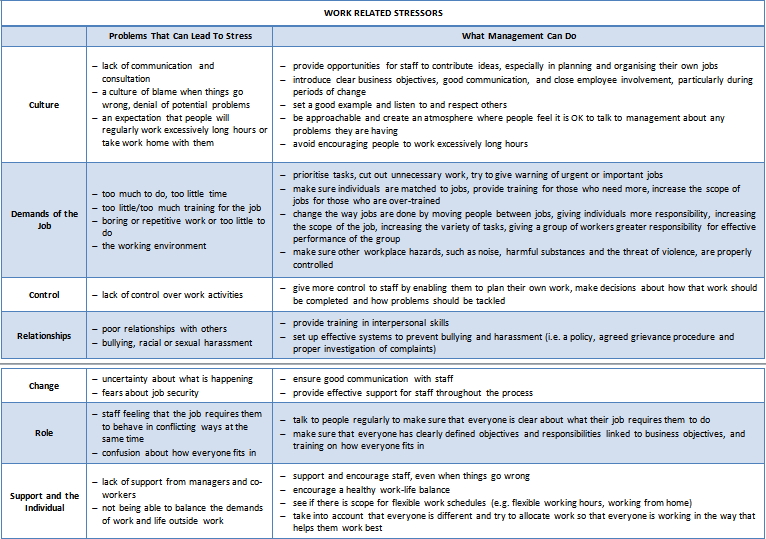
In today’s article I am discussing the issue of work related stress and how you can manage it as an employer.
What is Stress?
Stress is the adverse reaction some people may have to extreme pressure. If stress is intense and continues for some time, it can lead to mental and physical ill health issues, such as depression, nervous breakdowns or heart disease.
Is Stress the Concern of an Employer?
It is an employer’s duty by law to ensure that employees are not made ill by work. Apart from that, action to reduce stress can actually be very cost-effective. Stress in an organisation may result in increased staff turnover, a rise in absence, reduced performance, poor timekeeping and even customer complaints.
In addition to this, employers who don’t take potential stress issues seriously may be left open to claims from employees who have suffered ill health due to work related stress.
Under Health and Safety Law, what must be done about Stress?
Employers must assess all risks for potential stress in the workplace. A risk assessment for stress involves:
- looking for pressures at work that could cause high and long-lasting levels of stress
- deciding who might be harmed by these
- deciding whether enough is being done to prevent that harm
If issues are discovered, reasonable steps must then be taken to deal with those pressures.
Are Some People more likely to Suffer from Stress than Others?
Everyone is susceptible to stress, depending on pressure we’re under at any given time. An employer is responsible for making sure that work doesn’t make their employees unwell. If an employer notices that someone is particularly vulnerable because of their circumstances, they should look at how their work is organised and see if there are ways to relieve the pressure.
How can an Employer Recognise Stress in a Particular Person?
Outward signs of stress in an individual may be evident to managers and colleagues who work with that person all day every day. Employers should try and keep an eye on their employees and watch for changes in a person’s mood or behaviour, such as deteriorating relationships with colleagues, irritability, indecisiveness, absenteeism or reduced performance.
How can an Employer find out if Stress is a Problem for their Company?
First, employers must look into staffing matters to get an indication of what issues there might be. This may be evident in an increase in absenteeism, lateness, disciplinary problems or staff turnover, or a reduction in output or quality of product or service. There may be reasons for these symptoms other than stress, however if they could be related to anxiety at work then employers should talk and listen to employees by asking them to describe the best and worst parts of their job, and whether the issues lead to uncomfortable pressure. The findings can then be used to identify common and persistent pressures, and who might be harmed by them.
It is important for employers to remember to:
- respect the confidentiality of staff
- tell employees what they plan to do with any information collected
- involve staff as much as possible in subsequent decisions
- involve safety representatives in plans and decisions
- if five or more staff are employed, record the findings from the risk assessment
- check from time to time that the situation hasn’t changed
What can an Employer do to Prevent Stress from becoming a Problem?
- Managing work related stress doesn’t happen overnight. Processes are ongoing and need to be built into an organisation. Start with these actions:
- Show that stress is taken seriously and be understanding towards people who admit to being under too much pressure
- Urge managers to be open minded and understanding towards what staff say to them about the pressures of their work
- Ensure that staff have the skills, training and resources they need to carry out tasks assigned to them, so they can be confident in completing their work
- If applicable, vary work conditions and be open minded towards flexible working hours to increase staff interest and sense of ownership
- Guarantee that employees are treated fairly and consistently and that bullying or harassment isn’t tolerated from the offset
- Ensure two-way communication at all times and don’t be afraid to listen to issues that arise
What should an Employer do if an Employee complains about being Stressed?
An employer should always listen to their staff members when an issue arises. If the stress is work related it’s important to address the source, involve the employee in decisions in moving forward and if necessary, encourage them to seek further help from a doctor. It is also imperative to ensure that the employee’s manager treats the issue with understanding and maintains confidentiality.
If a period of sick leave is recommended, an employer should keep in touch with the employee and their doctor and remember that flexibility is key in this situation. Consider if the employee in question could perhaps simply do part of their job, reduced hours or take on a different role within the company when sick leave ends.
The most important thing an employer must remember is that firing the staff member does not provide an easy way out as this will most likely result in an unfair dismissal claim.
What should an Employer do if Stress is a Problem?
There is no particular way of tackling work-related stress, as what an employer decides to do depends on company working practice and the causes of the problem. I have included a table below to show some of the most common pressures at work that might be relevant to smaller organisations, along with some suggestions about what to do.
The contents of this article are necessarily expressed in broad terms and limited to general information rather than detailed analyses or legal advice. Specialist professional advice should always be obtained to address legal and other issues arising in specific contexts.


 RSS Feed
RSS Feed